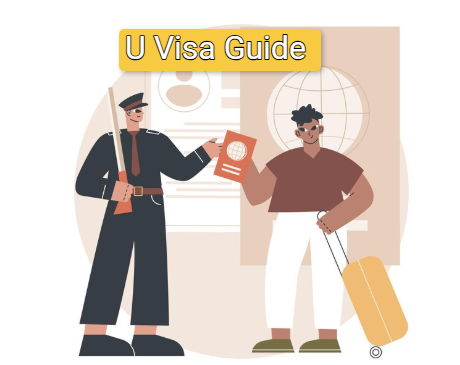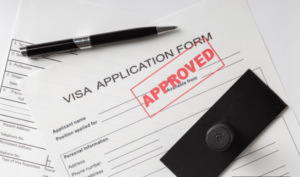What Is a U Visa and Who Qualifies for It? A Complete Guide

A U visa is a special type of visa for non-immigrants. The U.S. gives it to people from other countries who have been victims of certain crimes in America. This visa lets crime victims stay in the U.S. for a while as they help the police. It also gives them a chance to get a bona fide work permit and other perks. The U visa plays a key role in encouraging crime victims to speak up without worrying about being kicked out of the country. It offers them a way to find safety, get stable, and maybe even become permanent residents.
This complete guide takes a look at U visa requirements, the application process, U visa processing times, and more to help you navigate applying.
What Is a U Visa?
The U visa gives temporary legal status to non-citizens who have been victims of certain crimes in the United States. It aims to protect crime victims and witnesses encouraging them to help law enforcement investigate or prosecute crimes.
Besides shielding victims, the U visa also grants work permission through a bona fide work permit while officials process the applicant’s case. After some time, U visa holders can ask for permanent residency (a U visa green card) due to their status as crime victims.
U Visa Requirements and Eligibility

To get a U visa, you need to meet several key criteria. Here’s a breakdown of the steps:
- Qualifying Crime: You need to be a victim of one of the specific crimes that U.S. Citizenship and Immigration Services (USCIS) lists. These include domestic violence, human trafficking, sexual assault, and other similar crimes. To learn which offenses make you eligible for a U Visa, check out the what crimes qualify for a U Visa section.
- Cooperation with Law Enforcement: To get a U visa, you need to help cops investigate or prosecute the crime. This means you should be a good witness or give useful evidence for the case. You must get a U visa certification from a police agency to prove this.
- Suffering of Substantial Harm: The crime must have caused you serious physical or mental pain.
- U Visa Eligibility Criteria: You also need to meet other basic immigration rules. If you’ve done something bad or have a long rap sheet, you might not qualify for the U visa.
The U Visa Application Process
You now know the basic requirements so let’s explore the steps to apply for a U visa:
- Complete Form I-918: The first step in the application process involves filling out Form I-918, Petition for U Nonimmigrant Status. This form is necessary to apply for the U visa.
- Obtain Law Enforcement Certification: You need to submit a law enforcement certification (Form I-918, Supplement B) with your application. A law enforcement official must sign this document to confirm you helped in the investigation or prosecution of the crime.
- Submit Evidence of the Crime and Harm: With Form I-918, you must provide documents to support your claims. Include a detailed account of the crime, explain how it hurt you, and add any proof you have (like doctor’s notes, police paperwork, etc.).
- Submit Biometric Information: As part of your application, you’ll need to set up a time to visit USCIS. There, they’ll take your fingerprints and photos to run background checks.
- Wait for Processing: After you turn in all the required forms and proof, USCIS will review your case. The U visa processing time can change, and it might take anywhere from a few months to several years for them to look at your case. Get ready for this long wait.
U Visa Benefits

Getting a U visa in the United States has an impact on your life in several ways:
- Work Permit: Your U visa status makes you eligible to get a U visa bona fide work permit while you wait to hear about your visa. This work authorization lets you stay and work in the U.S. while your visa is being processed.
- Path to Green Card: After you’ve had your U visa for three years, you might be able to apply for a green card, which would allow you to live in the U.S. for good. People call this process (U visa to green card) and it’s open to those who’ve stuck to the visa rules.
- Family Member Benefits: Some family members of U visa holders can get their own U visas. This includes spouses, kids, and parents. These visas let them live and work in the U.S. They can also apply for green cards later on.
- Travel Document: If you have a U visa, you might be able to get a U visa travel document. This lets you travel outside the U.S. without losing your visa status.
U Visa Processing Time and Waiting Times
The time it takes to process a U visa can change based on several things, like how complex your case is, how many applications are in line, and how much work USCIS has to do, you might wait anywhere from a year to many years for a U visa. While you’re waiting, you might not hear back about your visa, but you can still get a work permit for your U visa. This lets you work in the U.S. until they make a final decision.
What Happens After U Visa is Approved?

After your U visa gets approved, you’ll have temporary nonimmigrant status for up to four years. You’ll also get U visa employment authorization, which lets you work in the U.S. during this time. After three years with a U visa, you can ask for permanent residency (a green card). If they say yes, you’ll have legal permanent residence in the U.S.
Common U Visa Denial Reasons
Your U visa application might get turned down for several reasons. Here are some of the usual ones:
- No Law Enforcement Certification: If you don’t include the required certification from law enforcement, they’ll reject your U visa application.
- Failure to Meet U Visa Requirements: Your application might get rejected if you can’t satisfy the U visa eligibility criteria. This includes proving the crime happened or showing you worked enough with law enforcement.
- Criminal Convictions: People with a big criminal record might not get the U visa because it raises questions about letting them in.
- Incomplete Documentation: If you don’t send in all the needed proof, they might say no to your application.
Conclusion
The U visa helps crime victims who need legal protection as they assist law enforcement with investigations or prosecutions. By checking the U visa requirements list, following the application steps with care, and learning about the U visa work permit advantages, you can boost your chances to succeed. Whether you apply for yourself or a family member, the U visa opens a path to safety, work, and maybe even permanent residency in the U.S.
Conclusion
If you need help with the U visa process or have questions about your case, check out Passage Law now. Our skilled immigration lawyers stand ready to help you at each stage. Contact us.
